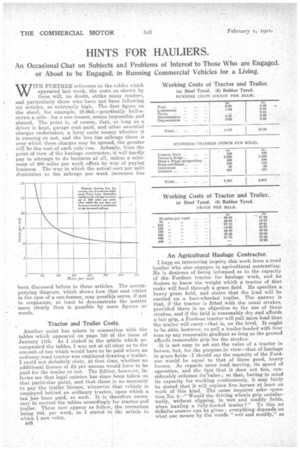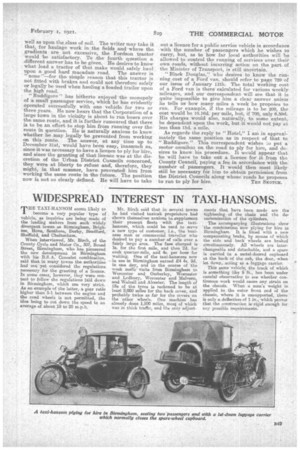• HINTS FOR HAULIERS.
Page 30

Page 31

If you've noticed an error in this article please click here to report it so we can fix it.
An Occasional Chat on Subjects and Problems of Interest to Those Who are Engaged, or About to be Engaged, in Running Commercial Vehicles for a Living.
W. . ITH FURTHER reference to the tables which appeared last week, the costs as shown by them will, no doubt, strike many readers, and particularly those who have not been following my articles, as extremely high. The first figure on the sheet, for example, 29.96d.—practically half-acrown a mile—for a one-tonner, seems impossible and absurd. The point is, of course, that, so long as a driver is kept, garage rent paid, and other essential charges undertaken, a lorry costs money whether it is running or not, and the less the' mileage there is over which these charges may :be spread, the greater will be thecost of each mile' run. Actually, from the point of view of the haulage contractor, it will hardly pay to attempt to do business at all, unless a minimum of 200 miles per week offers by way of paying business. The way in which the actual cost per mile diminishes as the mileage per week increases has been discussed before in these articles. The accompanying diagram, which shows how that cost varies in the case of a one-tanner, may possibly serve, if not to emphasize, at least to demonstrate the matter more clearly than is possible by Mere figures or words.
Tractor and Trailer Costs.
Another point has arisen in connection with the tables which appeared on page 729 of the issue of January 11th: As I stated in the article which accompanied, the tables, I was not at all clear as to the amount of tax -Which would have to be paid where an ordinary road tractor was employed drawing a trailer. I could riot definitely state, at that time, whether an additional licence of £2 per annum would have to be paid for the trailer or not. The Editor, however, informs me that legal opinion has since been taken on that particular point, • and that there is no necessity to pay the trailer licence, whenever that vehicle is employed behind an ordinary tractor, upon which a tax has been paid,as such. It is therefore neces.sary to correct the tables accordingly for tractor and trailer. These now appear as follow,. the correction being 10d. per week, as I stated in. the article to which I now refer. • B48 " I haw an interesting inquiry this week from a road haulier who also engages in agricultural contracting. He is desirous of being informed as to the capacity of • the Fardson tractor for haulage work, and he desires to know the .weight which a tractor of that make will haul through a grass field. He specifies a heavy grass field, and states that the load will be carried on a four-wheeled trailer. The answer is that, if the tractor is 'fitted with the usual strakes, provided there is no objection to the use of those strakes, and if the field is reasonably dry and affords a fair grip, a Fordson tractor will pull more load than the trailer will carry—that is, on the level. It ought to be able, however, to pull a trailerloaded with four tops up any reasonable gradient so long as the ground affords reasonable grip for the strakes.
It is not easy to set out.the value of a tractor in horses, but for the purpose_in view—that othaulage in grass fields--I should say the capacity of the Fordson Would be equal to that of three good, heavy horses. As. regards mere load moving, its speed of' operation, and the fact that it does not tire, considerably enhance itsnialue; so _that, having in mind its capacity for -working continuously, it may fairly be statedthat it will replace five horses at least on work of this kind. The same inquirer asks—question No. a' Would the driving wheels grip satisfactorily, without -slipping, in 'wet and muddy fields, when hauling a fully-loaded trailer '1" To this no definite answer can be given ; everything depends on what one means by the words " wet and muddy," as -well as upon the class of soil. The writer may take it that, for haulage work in the fields and where the gradients are not excessive, the Fordaan tractor would be satisfactory. To the fourth -question a different answer has to be given. He desires' to know what load a tractor of that make would safely haul upon a good hard macadam road. The answer is "none "—for the simple reason that this tractor is not fitted with brakes and could not therefore safely or legally be used when hauling a loaded trailer upon the high road.
" Ruddigare" has hitherto enjoyed the monopoly of a small passenger service, which he has evidently operated successfully with one vehicle, for two or three years. He now hears that the Corporation of a large town in the vicinity is about to run buses over the same route, and it is further rumoured that there is to be an effort to stop him from running over the route in question. Ho is naturally anxious to know whether he may legally be prevented from working on this route. The answer, at any time up to December 31st, would have been easy, inasmuch as, since it was necessary to have a licence to ply for hire, and since the granting of that licence was at the discretion of the Urban District Councils concerned, they were at liberty to refuse and, therefore, they might, in that manner, have prevented. him from working the same route in the future. The position now is not so clearly defined. Ile will have to take
out a licence for a, public service vehicle in accordance . with the number of passengers which he wishes to carry, but, as to haw far local authorities will be allowed to control the running of services over their own roads, without incurring action on the part of the Minister of Transport, is still uncertain.
"Black Douglas," who desires to know the running cost of a Ford van, should refer to page 729 of our issue of January 11th. The total working cost of a Ford van is there calculated for various weekly mileages, and our correspondent will see that it is quite impossible to give him a clear answer unless he tells us how many miles a week he proposes to run. For example, if the mileage is to be 200, the cost would be 10.16d. per mile, but, if 700, only 6.50d. His charges would also, naturally, to some extent, be dependent upon the work, but it would not pay at less than 15d. a mile.
As regards the reply to "Hotel," I am in approximately the same position as in respect of that to " Ruddigore." This correspondent wishes to put a mortar omnibus on the road to ply for hire, and desires to know his procedure. It would appear that he will have to take out a licence for it from the County Council, paying a fee in accordance with the number of passengers. It would then most likely atill he necessary for him to obtain permission from the District Councils along whose roads he proposes to run to ply for hire. Tim SIKOTC11.




































